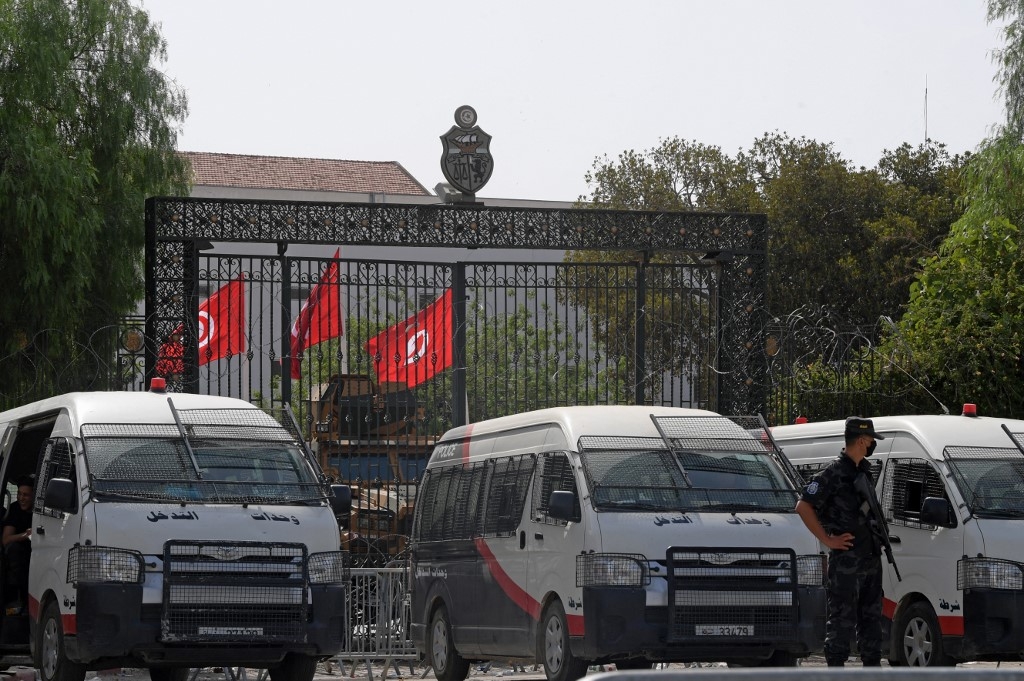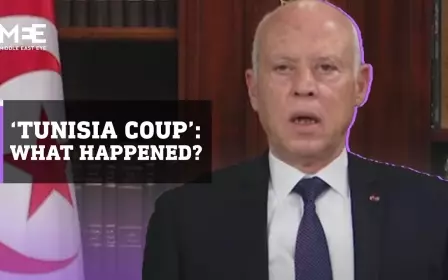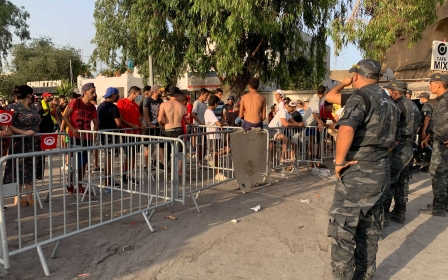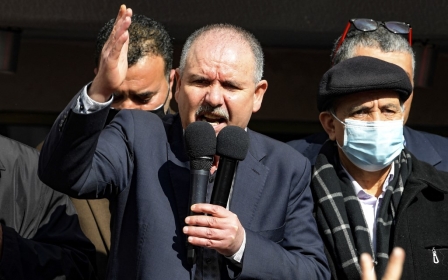Tunisia coup: How the world reacted

On Sunday, following days of anti-government protests, Tunisia’s President Kais Saeid announced the suspension of parliament, sacked the prime minister and assumed executive authority in the country.
While his supporters have seen the move as a decisive step to restoring stability in the crisis-ridden country, opposition politicians from across the political spectrum have denounced it, with Ennahda, the largest party in parliament, calling it a "constitutional coup".
Many countries around the world denounced Saeid's actions and expressed their concerns about the future of democracy in the country - though most stopped short of labelling what happened a "coup". Rights groups warned against a crackdown on human rights and press freedom.
The United States
In the United States, White House spokesperson Jen Psaki said the administration of US President Joe Biden is "concerned" about the development in Tunisia.
New MEE newsletter: Jerusalem Dispatch
Sign up to get the latest insights and analysis on Israel-Palestine, alongside Turkey Unpacked and other MEE newsletters
Speaking at a press briefing on Monday, Psaki said Washington has not assessed whether the efforts to seize power by Saied amount to a coup.
"Determination about a coup is a legal determination, and we would look to the State Department to conduct a legal analysis before making a determination, so there hasn't been a conclusion on that front," she said.
"We are in touch at a senior level from both the White House and the State Department with Tunisian leaders to learn more about the situation, urge calm and support Tunisian efforts to move forward in line with democratic principles."
Secretary of State Antony Blinken later on Monday spoke by telephone with Saied to urge respect for democracy after he sacked the government.
In his call, the top US diplomat urged Saied to "maintain open dialogue with all political actors and the Tunisian people," the State Department said in a statement.
"He encouraged President Saied to adhere to the principles of democracy and human rights that are the basis of governance in Tunisia," it said.
'We are seriously concerned by events in Tunisia over the weekend that threaten to jeopardize Tunisia’s important democratic transition and constitutional reform process'
- Gregory Meeks and Ted Deutch
Blinken also promised US support on Tunisia's economy and fight against Covid-19, a key factor in the protests that erupted around the nation.
Meanwhile, two top US lawmakers have expressed concern about the recent events in Tunisia, which they said endanger the North African country's democratic rule.
In a joint statement on Monday, the chair of the House Foreign Affairs Committee Gregory Meeks and Ted Deutch, who leads the subcommittee on the Middle East, called on Tunisian leaders to respect the rule of law.
"We are seriously concerned by events in Tunisia over the weekend that threaten to jeopardize Tunisia’s important democratic transition and constitutional reform process," the Democratic lawmakers said.
"We call on all parties to respect and adhere to the rule of law, work within established institutions, and engage in constructive dialogue to address differences. We implore all parties to refrain from violence and work towards a lasting solution to political tensions."
They added that the committee will work with President Joe Biden to help encourage Tunisia "back onto a democratic path".
The US State Department has also called for respecting civil rights and freedom of expression in Tunisia, saying that any political solution in the country must be based on the "principles of democracy, human rights and freedom".
In a statement released on Monday, State Department spokesperson Ned Price said Washington is closely monitoring the situation in Tunis.
"We have been clear in urging all parties to avoid taking any actions that could stifle democratic discourse or lead to violence," Price said.
"We are particularly troubled by reports that media offices have been closed and urge scrupulous respect for freedom of expression and other civil rights."
The European Union
The European Union on Tuesday called for a speedy return to political stability in Tunisia after the country plunged into turmoil following the president's ousting of the prime minister.
"We call for the restoration of institutional stability as soon as possible, and in particular for the resumption of parliamentary activity, respect for fundamental rights and an abstention from all forms of violence," the bloc's foreign policy chief Josep Borrell said in a statement.
France
Paris urged a return "as soon as possible" to the "normal functioning" of government in Tunisia.
The foreign ministry called "on all of the country's political forces to avoid any form of violence and to preserve the country's democratic gains".
Germany
A spokesperson for Germany's foreign ministry called for a return to "constitutional order as quickly as possible".
"Democracy has taken roots in Tunisia since 2011", ministry spokesperson Maria Adebahr said, referring to the year of the popular revolution that toppled dictator Zine El Abidine Ben Ali.
Germany was "very worried" she said, adding however: "We don't want to speak of a coup d'etat."
Russia
Kremlin spokesman Dmitri Peskov said Russia was monitoring developments in Tunisia.
"We hope that nothing will threaten the stability and security of the people of that country," he told reporters.
Turkey
Turkey's foreign ministry said it was "deeply concerned" by what had happened and called for the restoration of "democratic legitimacy".
President Recep Tayyip Erdogan's spokesman, Ibrahim Kalin, tweeted: "We reject the suspension of the democratic process and the disregard of the people's democratic will in friendly and brotherly Tunisia."
"We condemn initiatives that lack constitutional legitimacy and public support. We believe Tunisia's democracy will emerge stronger from this process."
Qatar
The Qatari foreign ministry said they hoped "Tunisian parties will adopt the path of dialogue to overcome the crisis".
Saudi Arabia
Saudi Arabia's Foreign Minister Faisal bin Farhan received a phone call from his Tunisian counterpart Othman Jerandi on Monday and voiced support for "security, stability and prosperity" in the North African country.
A statement published by the kingdom's official news agency, SPA, said the two diplomats discussed the "latest developments" in Tunisia, referring to Saied's push to consolidate power.
"The foreign minister stressed during the call the kingdom's backing for the security, stability and prosperity of the Tunisian Republic and its support for everything that would help achieve this," the statement said.
Mainstream media in the Gulf kingdom have been supportive of Saied's move. The Saudi Okaz daily newspaper on Monday, for example, had an entire front page on Tunisia with the headline “Tunisia rises up against the Brotherhood.”
United Arab Emirates
While there has been no official reaction from Abu Dhabi, Emirati media and pro-government figures have largely hailed Saied's move
The Emirati news outlet 20FourMedia reacted with the headline, "A brave decision to save Tunisia", while on Twitter the hashtag "Tunisia revolts against the Brotherhood" circulated around Saudi and Emirati accounts, a reference to Ennahda's links to the Muslim Brotherhood.
Bahrain
Bahrain, which often moves in political lockstep with Saudi Arabia and the UAE, both sworn enemies of the Muslim Brotherhood, voiced "hope for brotherly Tunisia to achieve good and development for greater stability and prosperity".
Jordan
Jordan's Foreign Minister Ayman Safadi on Twitter expressed hope "that our brothers will overcome these difficult situations in a way that preserves the safety, security and stability of Tunisia".
Algeria
Saied spoke by phone to Algerian President Abdelmadjid Tebboune but there was no word about their discussion.
Egypt
In Egypt, where the government has suppressed the Muslim Brotherhood, a movement long seen as backing Ennahda, there was no official reaction but state media presented Saied's move as part of a battle against the "terrorist Brotherhood organisation".
Libya
In neighbouring Libya, military commander Khalifa Haftar welcomed Saeid's actions and said he ordered his forces to be "ready to prevent the infiltration of any terrorist fighters who may flee Tunisia in light of the recent political turmoil.”
Arab League
In a phone call with the Tunisian foreign minister, Arab League chief Ahmed Aboul Gheit expressed "complete support for the Tunisian people".
A statement said the Cairo-based league hoped Tunisia would "move swiftly past the current turbulent phase in restoring stability".
Rights groups
Amnesty International has warned that the democratic rights and freedoms achieved by Tunisia's 2011 uprising are "at risk" after Saied's move to suspend the parliament's activities and consolidate executive power.
The rights group called on Saied to commit to respecting freedom of speech and the right to protest. It also condemned the raid on Al Jazeera's offices in Tunis on Monday.
'The hard-won freedoms and human rights gains of Tunisia’s 2011 uprising are at risk, particularly in the absence of a Constitutional Court to protect the rights of everyone in the country'
- Heba Morayef, Amnesty International
"The hard-won freedoms and human rights gains of Tunisia’s 2011 uprising are at risk, particularly in the absence of a Constitutional Court to protect the rights of everyone in the country," Heba Morayef, Amnesty International’s regional director for the Middle East and North Africa, said in a statement.
"President Kais Saied must ensure that any acts he orders are strictly in line with Tunisia’s obligations under international human rights law and most importantly must refrain from political purges."
Amnesty slammed Saied for taking charge of the prosecutor's office, an effort seen as a step towards a complete takeover of the state, including the judicial branch.
"Judicial independence is one of the cornerstones of a rights-respecting society and should not be trampled on," Morayef said.
"The concentration of powers in the hands of the executive branch is alarming. Tunisia’s president must uphold all fair trial guarantees for everyone and must not use his judicial powers to settle political scores or to conduct purges of critical voices."
Meanwhile, the Committee to Protect Journalists (CPJ) has denounced the raid by Tunisian security forces on Al Jazeera's bureau in Tunis, voicing concern about the threat to press freedom in the country.
"Today’s raid by Tunisian security forces on Al-Jazeera’s bureau jeopardizes the country’s bellwether status for press freedom in the region, 10 years after Tunisians fought to begin a transition to democracy," Justin Shilad, CPJ senior Middle East and North Africa researcher, said in a statement on Monday.
"Tunisian authorities must immediately and unconditionally allow Al Jazeera’s Tunis bureau to resume operations and let all journalists in the country work freely."
Al Jazeera had said that heavily armed security officers in plainclothes stormed the news network's offices in the Tunisian capital and expelled all staff from the building.
Media watchdog Reporters Without Borders (RSF) also denounced the security forces' raid on Al Jazeera.
"We demand the immediate reopening without delay of the bureau and the return to normal working conditions for journalists," a statement said.
Reuters and AFP contributed to this article
Middle East Eye delivers independent and unrivalled coverage and analysis of the Middle East, North Africa and beyond. To learn more about republishing this content and the associated fees, please fill out this form. More about MEE can be found here.




